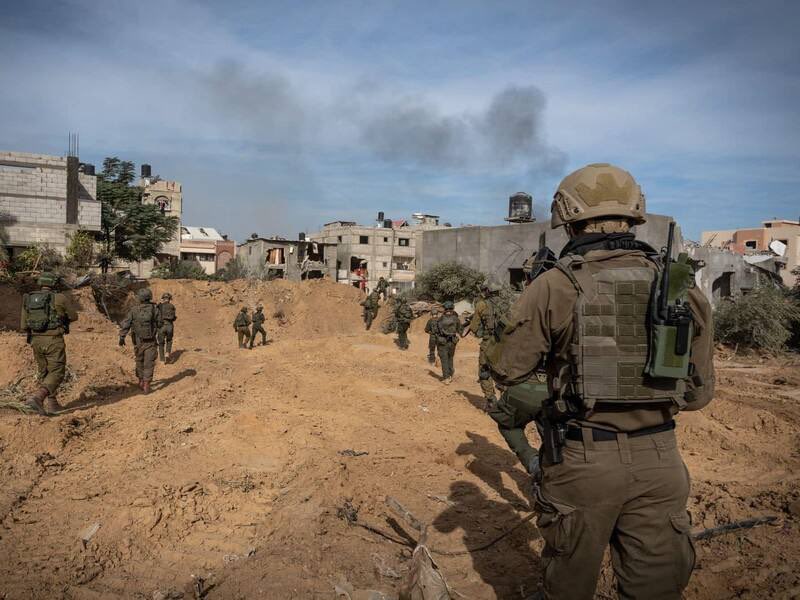Israel declares the withdrawal of thousands of troops from Gaza while continuing its relentless assault on the Gaza Strip and promising a prolonged war.
The Israeli military has declared a significant withdrawal of thousands of soldiers from the Gaza Strip, marking its first major troops pullback since the occupying entity’s war on Gaza started in October.
In a recent statement, the Israeli military announced the redeployment of five brigades, equating to several thousand troops, for “rest and training.”
However, during the briefing on Sunday, Army spokesperson Daniel Hagari did not indicate whether this move signifies a new phase in the assault.
Hagari said, “The objectives of the war require prolonged fighting, and we are preparing accordingly.”
Retired Brigadier General Shlomo Brom, formerly overseeing strategic planning in the Israeli military, suggested that this troop movement could be a response to US pressure, signalling a shift in Israel’s approach to the massacres it is committing in the Strip, reported Al Jazeera.
“The war is not stopping,” Brom stated. “It is the beginning of a different mode of operations.”
Israeli officials have outlined a three-stage strategy for the war.
The first stage involved intensive shelling for ground force access and “civilian evacuation.”
This was followed by the invasion of the Gaza Strip on October 27. With Israeli forces now largely controlling the area, despite ongoing Palestinian resistance, the military is advancing to its third phase, as revealed by an unnamed Israeli official to Reuters.
Despite extensive military operations, Israel has not achieved a single decisive victory over Hamas. The resistance group appears to be increasingly effective in inflicting casualties among Israeli soldiers and causing damage to military equipment.
The Israeli military reported 172 soldier fatalities since the commencement of ground operations in late October, with losses due to friendly fire, weapon malfunctions, and combat.
In terms of hostage rescue, Israeli forces have not successfully liberated hostages through force. Instead, they’ve killed many hostages.
The global PR war is another front where Israel is losing. The prevailing view in much of the international community is increasingly critical of Israel, with growing accusations of committing genocide against the Palestinians.
The Gaza Strip’s health ministry reported on Tuesday a death toll of 22,185 people in nearly three months of Israel’s assault.
Concurrently, the Israeli military has been engaged in cross-border confrontations with the Lebanese group Hezbollah, and there are reports that some of the five brigades withdrawn could be preparing for a potential second front against Hezbollah in Lebanon.
On Monday, Hezbollah announced via Telegram the deaths of three fighters in southern Lebanon, pledging to continue their struggle. Israel has confirmed targeting Hezbollah’s “military sites” in Lebanon.
According to Hezbollah and security sources, there are over 100 Hezbollah fighters and nearly two dozen civilian casualties, including children and the elderly.
How much is Israel spending on its assault?
Israel’s central bank has projected the cost of the ongoing war in Gaza to potentially reach approximately $58 billion, posing a significant strain on the occupying entity’s economy.
During a press conference on Monday evening, Central Bank Governor Amir Yaron emphasised the urgency for the Israeli government, led by Prime Minister Benjamin Netanyahu, to implement immediate measures to control public spending.
Yaron warned of potential adverse market reactions if the government fails to take prompt action to mitigate economic risks.
This call for fiscal prudence follows the central bank’s decision to lower its interest rate from 4.75% to 4.5%, marking the first such reduction since 2020.
Governor Yaron stressed the importance of strategic budget adjustments, highlighting the need for expenditure cuts, the elimination of unnecessary government ministries, and revenue enhancement to address the financial demands of the war.
“Not acting now to adjust the budget via cuts in expenditures, removing redundant ministries and increasing revenues in view of the needs of the war is likely to cost the economy much more in the future,” Yaron said.







